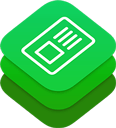Developer Resources
We work hard every day to make our apps the best they can be, but we know the world doesn’t end with the home button. Our work becomes part of a larger experience, and our apps are part of a unique set assembled by each user to fit their needs. From content creation and sharing to specialized editing, the possibilities are expansive and we want to give our users every opportunity to work with all of their apps as comfortably as possible.
Whether you’re an app developer, an aspiring one, or an experienced forScore user looking for new ways to improve your workflow, these resources will guide you through some of the ways forScore’s systems can help.
PDF Metadata
Metadata
We believe that a huge part of forScore’s success is that it brings the incredible power and capabilities of Apple’s latest hardware and software to the PDF sheet music collections people already have. While the PDF specification allows for limited storage of certain types of metadata, these fields don’t always make sense in a musical context. To help facilitate inter-app and cross-platform sharing of properly attributed sheet music, we have created a proposed standard for storing this information within the PDF specification’s limitations and hope to encourage its widespread adoption.
Table of Contents
For PDF files that contain multiple pieces, a table of contents is the perfect way to outline these divisions and help users navigate quickly and easily. This information is widely supported, and in forScore it can be especially useful for helping users create bookmarks so they can add specific pieces to their setlists without permanently splitting up their PDF documents.
Extensions
Action extensions allow third-party apps to present or manipulate a user’s content through quick, highly focused interactions that don’t require the user to switch apps or unnecessarily duplicate information. With forScore 10.4 or newer, action extensions can edit user content in-place (with their consent), opening up a wide range of additional capabilities.
Open In
On iOS and iPadOS, any app can make a document available to other compatible apps on a user’s device. Learn how to use these native sharing functions to provide some additional score-specific metadata without embedding that information into each file or relying on custom formats that might otherwise sacrifice the broad compatibility that comes with using standard PDF files.
Automation
With forScore’s custom URL scheme, links can be used to direct our app to specific content. They can navigate to a particular score, bookmark, page number, and setlist, or they can be used to open a cloud storage provider to your desired subdirectory (if supported). Embed links into PDF files, web pages, emails, and more. Their system-wide support makes them uniquely useful in a variety of contexts.
Formats
There’s a lot forScore can do, and there are a number of different file formats it employs. Learn more about the various file formats forScore supports, custom formats it uses to transport forScore-specific information, and differences between using standard system sharing functions and Drag & Drop gestures.
Partnerships
Our time is best spent continuing to develop forScore for Apple devices, but we know there are many alternatives out there. If you’re a developer working on a sheet music reader for other platforms, we’d love to talk to you. Partner with us to make our apps more compatible with each other, join us to make something even bigger, or just say hello and ask us about our work.
If you make another sheet music reader for iOS, iPadOS, or macOS, we’d love to talk to you too. There are a lot of mature choices out there for musicians, and there’s plenty of room for the kinds of collaboration that benefit all of us. No one app will ever be perfect for everyone, and we don’t ever want people to feel locked in. That’s why we designed forScore around PDF files, after all, and we think that was just the start.




